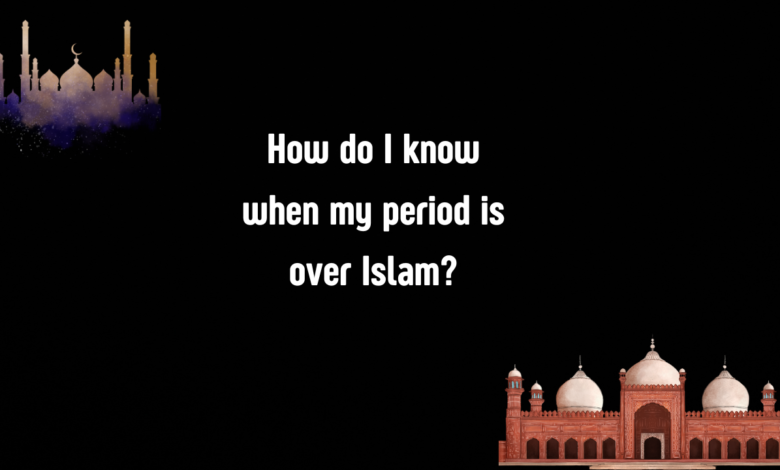How do I know when my period is over Islam?

Introduction
Menstruation, a natural physiological process, is a topic of significant importance in Islam due to its implications on daily prayers, fasting, and other religious activities. The duration of menstruation varies among women, but it’s essential for Muslim women to know how to determine when their period is over to resume their religious duties. This article will explore the guidelines provided by Islamic teachings and practical methods for recognizing the end of menstruation.
The Menstrual Cycle in Islam
In Islamic teachings, menstruation is considered a natural and normal biological process that temporarily exempts women from certain religious obligations. During menstruation, women are excused from performing daily prayers (Salat) and fasting during the month of Ramadan. The exact duration of menstruation varies from woman to woman, usually lasting between three to seven days. However, Islamic law provides guidelines for determining the end of menstruation.
Determining the End of Menstruation
Observing Physical Signs: The most common method to determine the end of menstruation is by observing the physical signs. Women often experience a change in the color and consistency of their discharge towards the end of their period. Once the discharge changes from red or brown to a lighter color, such as yellow or white, and becomes thinner, this is often considered an indication that menstruation has ended.
Absence of Blood: Islamically, the end of menstruation is marked by the complete absence of menstrual blood. When a woman no longer observes any blood flow, this signifies that her period has concluded.
Pure White Discharge (Tuwāṭ): According to some scholars, the appearance of pure white discharge (known as “tuwāṭ”) is a sign that menstruation has ended. This discharge should be clear, odorless, and distinct from menstrual blood.
Ghusl: Performing a ritual purification bath (ghusl) at the end of menstruation is a common practice. Once ghusl is performed, a woman is considered ritually pure and can resume her religious obligations.
Regular Menstrual Cycle: Many women have regular menstrual cycles, which means their periods follow a predictable pattern. In such cases, women can anticipate the end of their menstruation based on their historical cycle duration.
Consulting Religious Scholars
It’s important to note that interpretations may vary among different schools of Islamic jurisprudence and scholars. If there is uncertainty regarding the end of menstruation, it’s recommended to consult knowledgeable religious scholars or imams who can provide guidance based on the specific Islamic tradition followed.
Resuming Religious Duties
Once a woman is confident that her menstruation has ended, she can resume her religious duties, including daily prayers, fasting, and engaging in acts of worship. It’s worth mentioning that even if a woman experiences irregular cycles, Islam is a religion of mercy, and God’s understanding of human nature is reflected in the flexible approach to menstruation and its implications on religious practices.
Conclusion
Understanding when menstruation is over is of utmost importance for Muslim women to ensure that they can resume their religious obligations. By observing physical signs, tracking menstrual patterns, and seeking guidance from knowledgeable scholars, women can confidently determine the end of their menstruation. Islam acknowledges the natural cycle of menstruation and provides guidance to enable women to continue their devotion to their faith with peace of mind and confidence.
FAQs about Determining the End of Menstruation (Hayd) in Islam
How do I know when my period is over in Islam?
In Islam, the end of menstruation (hayd) is indicated by the cessation of bleeding. Once bleeding stops completely, a woman is considered ritually pure (tahir) and can resume acts of worship, including prayer and intimacy with her spouse.
Is there a specific timeframe for the end of menstruation in Islam?
There is no fixed duration for menstruation mentioned in Islamic teachings. The duration can vary from woman to woman. Typically, it lasts between three to seven days. Once the bleeding stops, the period is considered over.
How can I determine if my period has ended?
To determine if your period has ended, observe if there is no more bleeding. This includes checking your underwear and using tissue. If there is no blood for a complete prayer cycle (Salah), you can assume your period has ended.
Can spotting or discolored discharge affect the end of my period?
Spotting or discolored discharge can sometimes occur after the cessation of regular menstrual bleeding. In Islam, as long as the bleeding has completely stopped, even if there’s spotting, you are considered ritually pure and can perform acts of worship.
Can I perform ritual ablution (wudu) and pray immediately after my period ends?
Yes, once your period has ended, you can perform ritual ablution (wudu) and engage in acts of worship, including prayers. Make sure there is no active bleeding before you begin.
Is there any specific supplication or action to mark the end of menstruation?
re is no specific supplication or action required to mark the end of menstruation. You can simply determine that your bleeding has stopped, perform ablution, and continue with your regular activities, including prayers.






